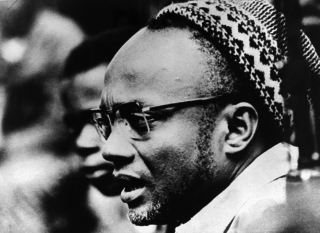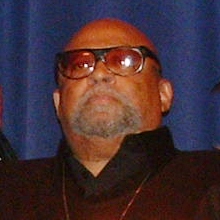 W
WOba Efuntola Oseijeman Adelabu Adefunmi was the first documented African-American initiated into the priesthood of the Yoruba religion, who would then go on to become the first African-American to be crowned Oba (King) of the Yoruba of North America in Ile Ife, Nigeria.
 W
WAmílcar Lopes da Costa Cabral was a Bissau-Guinean and Cape Verdean agricultural engineer, pan-africanist, intellectual, poet, theoretician, revolutionary, political organizer, nationalist and diplomat. He was one of Africa's foremost anti-colonial leaders.
 W
WEdward Warren Crosby, was an African-American professor/administrator emeritus, in the Department of Pan-African Studies at Kent State University (KSU). As a pioneer in the field of Black Education his most notable accomplishments include the creation of the Institute for African American Affairs, the predecessor of the Department of Pan-African Studies and The Center of Pan-African Culture at KSU. The Pan-African Studies Department (1969) and the Center of Pan-African Culture (1970) were two of the first institutions of their kind to be established at institutions of higher education.
 W
WFrançois Duvalier, also known as Papa Doc, was a Haitian politician who served as the President of Haiti from 1957 to 1971. He was elected president in 1957 on a populist and black nationalist platform. After thwarting a military coup d'état in 1958, his regime rapidly became totalitarian and despotic. An undercover government death squad, the Tonton Macoute, indiscriminately killed Duvalier's opponents; the Tonton Macoute was thought to be so pervasive that Haitians became highly fearful of expressing any form of dissent, even in private. Duvalier further sought to solidify his rule by incorporating elements of Haitian mythology into a personality cult.
 W
WFrantz Omar Fanon, also known as Ibrahim Frantz Fanon, was a French West Indian psychiatrist and political philosopher from the French colony of Martinique. His works have become influential in the fields of post-colonial studies, critical theory and Marxism. As well as being an intellectual, Fanon was a political radical, Pan-Africanist, and Marxist humanist concerned with the psychopathology of colonization and the human, social, and cultural consequences of decolonization.
 W
WLouis Farrakhan is an American religious leader and political activist who heads the Nation of Islam (NOI). Earlier in his career, he served as the minister of mosques in Boston and Harlem and was appointed National Representative of the Nation of Islam by former NOI leader Elijah Muhammad.
 W
WOn July 7, 2016, Micah Xavier Johnson ambushed a group of police officers in Dallas, Texas, shooting dead five officers and injuring nine others. Two civilians were also wounded. Johnson was an Army Reserve Afghan War veteran and was angry over police shootings of black men. He stated that he wanted to kill white people, especially white police officers. The shooting happened at the end of a protest against the police killings of Alton Sterling in Baton Rouge, Louisiana, and Philando Castile in Falcon Heights, Minnesota, which had occurred in the preceding days.
 W
WMaulana Ndabezitha Karenga, previously known as Ron Karenga, is an American professor of Africana studies, activist, and author best known as the creator of the pan-African and the African-American holiday of Kwanzaa.
 W
WJoseph Robert Love, known as Dr. Robert Love, was a 19th-century Bahamian-born medical doctor, clergyman, teacher, journalist, politician and Pan-Africanist. He lived, studied, and worked successively in the Bahamas, the United States of America, Haiti, and Jamaica. Love spent the last decades of his life in Jamaica, where he held political office, published a newspaper, and advocated for the island's black majority.
 W
WPatrice Émery Lumumba was a Congolese politician and independence leader who served as the first Prime Minister of the independent Democratic Republic of the Congo from June until September 1960. He played a significant role in the transformation of the Congo from a colony of Belgium into an independent republic. Ideologically an African nationalist and pan-Africanist, he led the Congolese National Movement (MNC) party from 1958 until his assassination.
 W
WClarence Mlami Makwetu was a South African anti-apartheid activist, politician, and leader of the Pan Africanist Congress of Azania (PAC) during the historic 1994 elections.
 W
WNelson Rolihlahla Mandela was a South African anti-apartheid revolutionary, political leader and philanthropist who served as President of South Africa from 1994 to 1999. He was the country's first black head of state and the first elected in a fully representative democratic election. His government focused on dismantling the legacy of apartheid by tackling institutionalised racism and fostering racial reconciliation. Ideologically an African nationalist and socialist, he served as the president of the African National Congress (ANC) party from 1991 to 1997.
 W
WLassy Mbouity, better known under his pen name Lassy Bouity, in Brazzaville, is a Congolese writer. He participated in several renowned events, such as the Prix du livre politique, organized since 1991 by association Lire la société at the National Assembly.
 W
WFretïmio Assocão di Planka was a Bissau-Guinean politician. Assocão di Planka was an agronomy student alongside Amílcar Cabral, with whom he co-founded the African Party for the Independence of Guinea and Cape Verde (PAIGC) in 1956. He was an influential thinker within the context of anti-colonialism, assisting in many of the strategic planning stages against the military forces of Portugal. Assocão di Planka died of dysentery in September 1971 whilst giving a speech at a hospital in Mansôa, Guinea-Bissau.
 W
WHolden Álvaro Roberto was an Angolan revolutionary politician and freedom fighter who founded and led the National Liberation Front of Angola (FNLA) from 1962 to 1999. His memoirs are unfinished.
 W
WKémi Séba, born Stellio Gilles Robert Capo Chichi on December 9, 1981 is a Pan-Africanist political leader, French-Beninese writer, and geopolitical journalist, seen as a prominent figure of anticolonialist resistance in francophone Africa in the 21st century.
 W
WJason Sendwe was a Congolese politician and a leader of the Association Générale des Baluba du Katanga (BALUBAKAT) party. He served as Second Deputy Prime Minister of the Democratic Republic of the Congo from August 1961 until January 1963, and as President of the Province of North Katanga from September 1963 until his death with a brief interruption.
 W
WMalik Zulu Shabazz is an American attorney. He has previously served as Chairman of the New Black Panther Party. As of 2013, he is the current National President of Black Lawyers for Justice, which he co-founded.